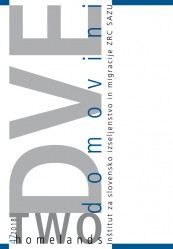The Dynamics of Othering in Activism as Part of Germany’s Post-2015 “Willkommenskultur”
DOI:
https://doi.org/10.3986/dd.2018.1.04Keywords:
Othering, Willkommenskultur, activism, humanitarianism, refugeesAbstract
The article critically evaluates the involvement of activists in the country’s often praised Willkommenskultur (culture of welcome). Using humanitarianism as a starting point, it investigates the ways activists otherise refugees in spite or because of seemingly good intentions. The analysis of interviews conducted with activists in Northern Germany showed that Othering among activists takes different forms, depending on their form of involvement and individual characteristics, such as their (lack of a) personal flight history. Exclusionary Othering is predominantly used by activists who are not sensitised to power hierarchies, while other activists often employ inclusive Othering when attempting to connect on an equal level.
Downloads
References
Agier, Michel (2011). Managing the Undesirables: Refugee Camps and Humanitarian Government. Cambridge: Polity Press.
Aronson, Elliot, Wilson, Timothy, Akert, Robin (2014). Sozialpsychologie. Hallbergmoos: Pearson Deutschland.
Attia, Iman (2015). “Die westliche Kultur” und ihr Anderes: Zur Dekonstruktion von Orientalismus und antimuslimischem Rassismus. Bielefeld: Transcript Verlag.
Barnett, Michael N. (2013). Humanitarian Governance. Annual Review of Political Science 16, 379–398.
Bertelsmann Stiftung (2012). Deutschland öffne dich! Willkommenskultur und Vielfalt in der Mitte der Gesellschaft verankern. Gütersloh: Verlag Bertelsmann Stiftung.
Brossard Borhaug, Frédérique (2016). How to Challenge a Culturalization of Human Existence? Promoting Interculturalism and Ethical Thinking in Education. Ambivalence 3/1, 1–15.
Bundesamt für Migration und Flüchtlinge (2016). Das Bundesamt in Zahlen 2015. Asyl, Migration und Integration, http://www.bamf.de/SharedDocs/Anlagen/DE/Pub likationen/Broschueren/bundesamt-in-zahlen-2015.pdf;jsessionid=642E059F-3D063E1A39EE0ED8EC2DDAD9.1_cid359?__blob=publicationFile (22. 12. 2016).
Calhoun, Craig (2010). The Idea of Emergency: Humanitarian Action and Global (Dis) Order. Contemporary States of Emergency: The Politics of Military and Humanitarian Interventions (eds. Didier Fassin, Mariella Pandolfi). New York: Zone Books.
Canales, Mary (2000). Othering: Toward an Understanding of Difference. Advances in Nursing Science 22/4, 16–31.
Dworkin, Gerald (1972). Paternalism. The Monist 56, 64–84.
Fischhaber, Anna (2015). Was hinter der Hilfsbereitschaft der Deutschen steckt, http://www.sueddeutsche.de/leben/willkommenskultur-fuer-fluechtlinge-was-hinterder-hilfsbereitschaft-der-deutschen-steckt-1.2642991 (26. 11. 2016).
Flick, Uwe (2009). An Introduction to Qualitative Research. London: SAGE.
Fuad Luke, Alastair (2009). Design Activism: Beautiful Strangeness for a Sustainable World. Abingdon: Earthscan.
Hadley, Louisa (2013). The Language of Othering, https://inspire.dawsoncollege.qc.ca/2013/11/13/the-language-of-othering/ (30. 12. 2016).
Hall, Stuart (1992). Representations: Cultural Representations and Signifying Practices. London, Thousand Oaks, New Dehli: SAGE.
Harrebye, Silas (2016). Social Change and Creative Activism in the 21st century: The Mirror Effect. London: Palgrave Macmillan.
Harrel Bond, Barbara (2002). Can Humanitarian Work with Refugees be Humane? Human Rights Quarterly 24/1, 51–85.
Heckmann, Friedrich (2014). Was bedeutet “Willkommenskultur“? Vertretung der Friedrich-Ebert-Stiftung in der Russischen Föderation, 1–8.
Howe, Lorien (2015). The Problematic Nature of Humanitarian Aid. Undergraduate Honors Theses. Paper 804.
Jensen, Sune Q. (2011). Othering, Identity Formation and Agency, Qualitative Studies 2/2, 63–78.
Joffe, Josef (2015). Das deutsche Wunder, http://www.zeit.de/2015/37/willkommenskultur-deutschland-fluechtlinge-zeitgeist (26. 11. 2016).
Krumer Nevo, Michal, Sidi, Mirit (2012). Writing against Othering. Qualitative Inquiry 18/4, 299–309.
Mamdani, Mahmood (1973). From Citizen to Refugee: Ugandan Asians come to Britain. Kampala: Pambazuka Press.
Martin, Roger L., Osberg, Sally (2007). Social Entrepreneurship: The Case for Definition. Stanford: Leland Stanford Jr. University.
Mayring, Philipp (2015). Qualitative Inhaltsanalyse: Grundlagen und Techniken. 12th ed. Weinheim, Basel: Beltz.
Mead, Tania S. (2015). Between Care and Control: The Uses and Abuses of Humanitarianism in Contemporary Migration Debates. Vancouver: The University of British Columbia.
Nussbaum, Martha C. (1995). Objectification. Philosophy & Public Affairs 24/4, 249–291.
Olsen, Christopher, El-Bialy, Rowan, Mckelvie, Mark, Rauman, Peggy, Brunger, Fern (2016). “Other“ Troubles: Deconstructing Perceptions and Changing Responses to Refugees in Canada. Journal of Immigrant and Minority Health 18/1, 58–66.
Pallister Wilkins, Polly (2015). The Humanitarian Politics of European Border Policing. Frontex and Border Politics in Evros. International Political Sociology 9, 53–69.
Tezcan, Levent (2011). Spielarten der Kulturalisierung. Zeitschrift für Kulturphilosophie 5/2, 357–376.
Downloads
Published
How to Cite
Issue
Section
License

This work is licensed under a Creative Commons Attribution-NonCommercial-NoDerivatives 4.0 International License.
Authors guarantee that the work is their own original creation and does not infringe any statutory or common-law copyright or any proprietary right of any third party. In case of claims by third parties, authors commit their self to defend the interests of the publisher, and shall cover any potential costs.
More in: Submission chapter





